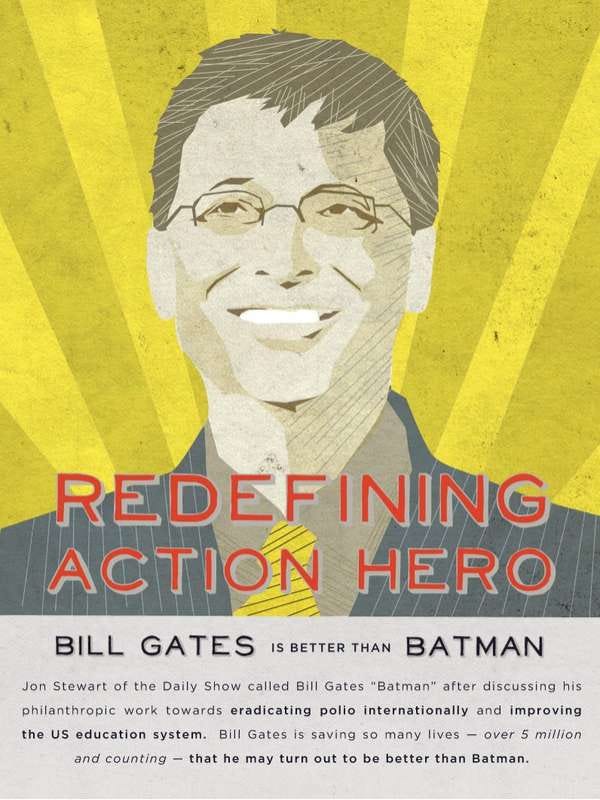Antitrust Kills
Since 2007, Bill Gates has given away $28B, 48% of his net worth. Frugal Dad estimates that he’s saved almost 6 million lives. I haven’t double-checked his sources, but it’s a plausible estimate.
Back in the nineties, Bill Gates was experiencing far less favorable publicity – and legal persecution. The U.S. government sued Microsoft for antitrust violations. In 2000, Alex Tabarrok estimated that the antitrust case had cost Microsoft shareholders $140B. Yes, Microsoft ultimately reached a relatively favorable settlement. But Gates probably would have been billions richer if antitrust laws didn’t exist.
You might say, “Who cares? He can afford it.” But hold on. We’re talking about a great philanthropist. If Bill Gates were $5B richer, he almost certainly would have increased his charitable giving. A conservative assumption is that he would have stuck with his current ratio, giving away 48% of the extra $5B. It’s quite possible that he would have given away every dollar.
If Gates’ philanthropy is as efficacious as most people think, there’s a shocking implication: The antitrust case against Microsoft had a massive body count. Gates saves about one life for every $5000 he spends. If the case cost him $5B, and he would have given away 48%, antitrust killed 480,000 people. If the case cost him $5B, and he would have given away every penny, antitrust killed a million people. Imagine how many people would be dead today if the government managed to bring Microsoft to its knees, and Gates to bankrutpcy. It staggers the imagination.
You might object, “By that standard, Gates himself is killing millions by failing to give even more.” If you’re a consequentialist, that’s exactly correct; we’re all murderers in the eyes of Jeremy Bentham and Peter Singer. But if we stick to the common sense distinction between “killing” and “letting die,” Gates is innocent, and the government remains guilty. Outsourced to philosopher Michael Huemer:
It is possible to harm someone not only by directly inflicting a harm, but also by actively preventing that person from taking actions to avert or remedy a harm. Suppose that, through no fault of mine, Marvin is in danger of starvation. He asks me for food. If I refuse to give him food, I thereby fail to confer a benefit on Marvin and, at the same time, allow Marvin to go hungry. If Marvin then starves to death, those who accept the doing/allowing distinction would say that I have not killed Marvin, but merely allowed him to die. And some believe that this is much less wrong than killing, possibly not even wrong at all. But now consider a different case. Suppose that Marvin, again in danger of starvation, plans to walk to the local market to buy some food. In the absence of any outside interference, this plan would succeed–the market is open, and there are people willing to trade food for something that Marvin has. Now suppose that, knowing all this, I actively and forcibly restrain Marvin from reaching the market. As a result, he starves to death. In this situation, I would surely be said to have killed Marvin, or at least done something morally comparable to killing him.
The same holds, of course, if someone robs a philanthropist who otherwise would have come to Marvin’s assistance.
The post appeared first on Econlib.



Hi Brian - please read up on Bill Gates. The book "Controligarchs" is a really eye opening read. Bill Gates's "philanthropy" is absolutely questionable. He invested in BioNTech well before the Covid madness in 2020 and suddenly earned a windfall as the Pfizer jab was mandated. He invested in Impossible Burger and has been buying up agricultural land and is an advocate for eradicating cows and a vegan lifestyle in the name of "saving the planet." Meanwhile flying around the world in his private jet.
He wouldn't have been even a millionaire, let alone billionaire, if it wasn't for intellectual property ("property") laws. We could outsource this question to Huemer as well. Many marvins starved because they weren't allowed to build on (to advance, to improve) Windows because of intellectual property "rights" (patents, copyrights, etc.).